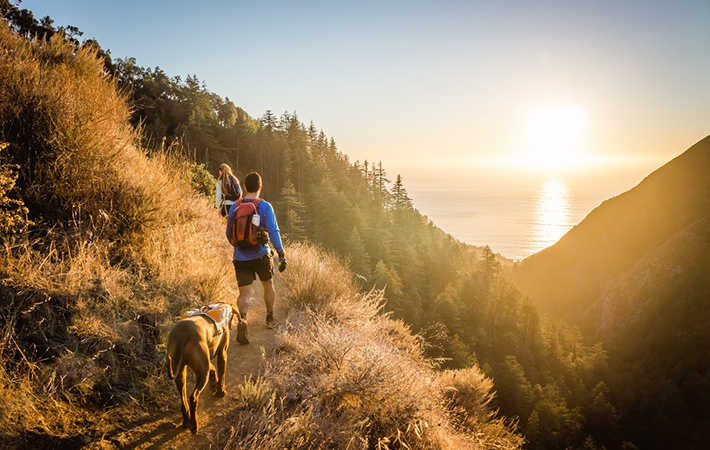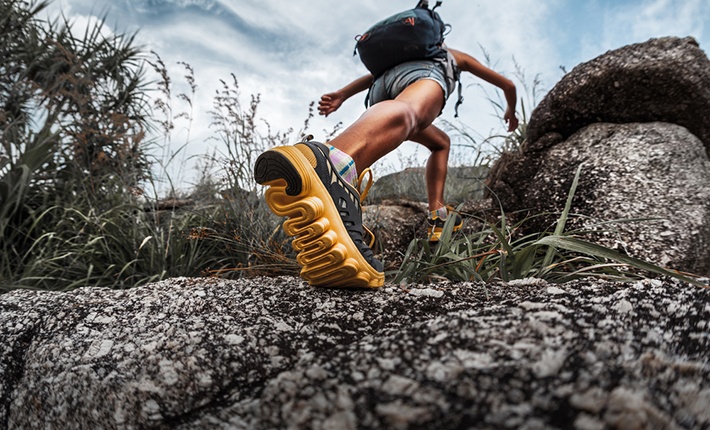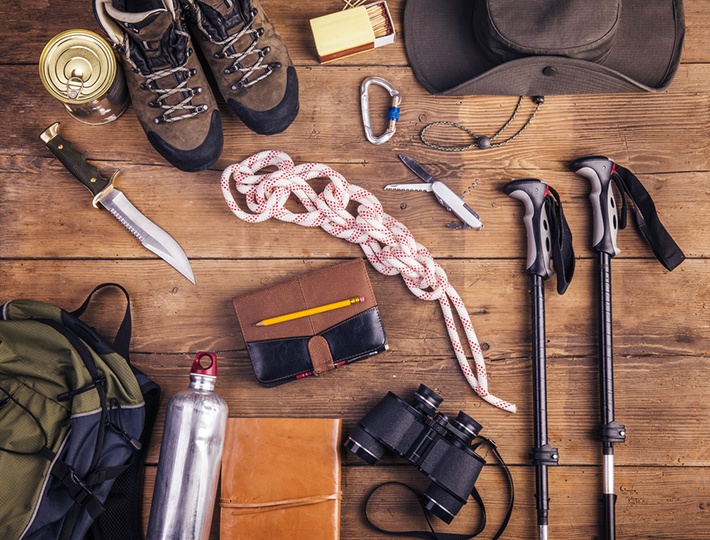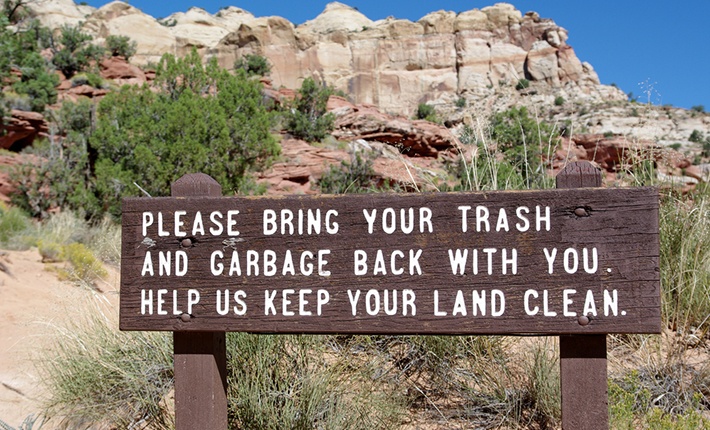Most of us today live in concrete jungles, spending far less time outside in green, natural spaces, then people did several generations ago.
We live in a dynamic, stressful world, so full of schedules and so short of time, often forgetting how strong nature impacts our mental and physical wellbeing.
Connecting with nature is a great way rid ourselves of stress, tension, to restore mental energy and boost our physical condition. And what is better than walk in nature?
It doesn't matter if you are young or old, a couch potato or intrepid explorer, walking in nature may be the healthiest thing you can do.
More...
It gives you peace, clears your mind, increases your energy, stamina, and endurance, it strengthens your heart and lungs. Benefits are numerous.
In this article, we are focusing on two specific forms of walking in nature: hiking vs trekking.
Most people often get confused between the two. What are those?

Definitions
We know that both hiking and trekking include physical activity, mainly walking in natural environments with equipment.
First, let's start with definitions and origins of two words.
1) What is Trekking?
The word 'trek' comes from Afrikaans word which means 'to pull and travel.' Trekking represents a longer, more challenging journey on foot, usually on uncharted paths.
2) What is Hiking?
Hiking is defined as walking or marching a great distance, usually through rural areas, for pleasure, exercise, military training or the like.
It is an English dialectal word of unknown origin, recorded in the early 1800s, which means "to walk vigorously."
It is called differently in other countries - bushwacking in Australia, tramping in New Zealand, backpacking in North America and hillwalking in the UK.
Locations

HIKING | TREKKING |
|---|---|
Hiking mainly represents leisure walking in beautiful natural environments, nature trails and hills. Hiking trails are charted and often signposted, so people don't lose their way. Hiking is a great holiday experience amongst the population of the major cities especially in Switzerland, Germany, and Scandinavian countries. There are many hiking trails, especially in Canada, Hawaii, New Zealand, Norway- countries of beautiful landscapes. | On the other way, trekking takes place on uncharted and non-marked trails, not exclusively in areas of exquisite beauty. Unlike hiking, it takes place in areas where there is no vehicular transport. Famous trekking trails are in Nepal, Australia, Tasmania, Alaska, South America and India. One of the most challenging trekking routes is the famous "Inca trail" to Machu Picchu in Peru. It manages to combine beautiful mountain scenery, subtropical jungle and a stunning mix of Inca ruins, tunnels and paving stones. |
Longevity and Intensity
1) Hiking
Hiking represents an easy to moderately paced activity to relax, exercise, or simply have fun while enjoying the breeze and the beauty of nature. It's often a one-day activity or a few day activity at most.
Since hiking is not a particularly challenging activity, it is suitable for almost everyone that enjoys the company of nature and can walk for a few hours.

2) Trekking
Trekking is, by all means, longer, more challenging and more intense than hiking.
Those rigorous, long journeys on foot could last several days, weeks, or even months, depending on distance, and they test one's physical ability, endurance, and mental strength as well.
It often requires the use of maps, orientation knowledge, and survival skills.
Trekkers may be challenged in various ways during their journey, so they are often well prepared and equipped.
It is a challenge that not everyone can conquer, but an excellent way to explore the unmarked terrain and get as close as possible to nature.
Discover More: 10 Best Songs for a Fun Hiking Trip
Equipment
1) Hiking Equipment
When it comes to the equipment, there is a big difference between hiking and trekking.
First of all, hiking doesn't require lots of prior planning and organizing, and most of the hikes can be done with only essentials in one's backpack.
Take water, snacks, mosquito repellent, and you are good to go!
Depending on the weather, for a simple hike, you'll probably need waterproof shoes, hat, and a waterproof jacket.
For longer hikes, it's good to have a compass, hiking pole and first aid kit. A tent or a sleeping bag could be a good choice to bring if you decide to go hiking at night.

2) Trekking Equipment
On the other hand, trekking, as a more challenging activity, requires careful planning and preparation.
Full camping gear and survival kit are a must. Water and food are essential, so it is advised to bring enough of both.
Because trekking is often a long journey, it is a wise choice to have clothes applicable to changes in temperature, especially if trekking in mountainous areas.
Nights tend to be cold in the mountains, so one should bring fire lightning tools- matches or a flint.
If trekking route is challenging, equipment such as trekking poles, or even a ski poles can be very useful.
First aid kid is strongly advised, as dehydration, hypothermia, internal injuries, frostbite, sunburn, or even animal attacks are common.
Having compass and maps can sometimes mean the difference between life and death, and orienteering skills can save you much time and effort. Even a GPS device could prove handy.
Health Benefits
Hiking and trekking have many health benefits, ranging from physical to mental to spiritual.
First of all, both hiking and trekking are good because they let you take control of your workout.
No trendy trainers, no high-intensity workouts- an approach that doesn't work for everyone. With hiking and trekking, you chart your own course and set your own pace.
Both activities tone your muscles- simple hiking can get you into better shape and help you lose weight, without too much pressure on your joints.
But clambering over rocks and sharp inclines, using trekking poles gives your body an all-over workout, strengthening your glutes, hamstrings, leg muscles, bones and your core.

Just one hour of trekking can burn well over 500 calories, depending on the level of incline and the weight of the pack you are carrying.
Hiking is awesome to your heart health, lowering the risk of heart disease and keeping your blood pressure and sugar level in control.
They also boost your mood, decreasing tension, confusion, anger and depression, and increasing energy.
Both enhance focus and concentration and is also believed to improve memory and functionality of the brain.
Trekkers and hikers must clear their thoughts and prepare their minds to face topographical challenges.
However, trekking, as a much more challenging, requires from you to adjust, tolerate and fight the adverse nature psychologically as the game becomes more mental than physical.
All these environmental conditions and challenges have a deep impact on our body and mind, and they are the unique test to your mental strength.
Environmental Impact

Both hiking and trekking, like the other activities in nature, have a "Leave no trace" policy, to reduce the impact of their presence on the natural environment.
It is a set of outdoor ethics which promote conservation of the outdoors.
1) Hiking
Hikers, over many years in an area, can destroy the natural environment they walk in by gathering wood, setting campfires, leaving non-biodegradable matter and fecal matter. Bigger the group size, bigger the environmental impact.
2) Trekking
On the other hand, trekking has its negative effects on the environment, other than ones that hiking impacts.
Trekkers pluck wild plants which some locals eat and cultivate, for medical value, decorative purpose or curiosity.
Trekking causes trampling and widening of the trail, creates multiple paths and increases soil erosion. Spotting humans frequently disturbs wild animals and their natural instincts.
Conclusion
I hope this article was helpful to you. Now do you know the difference between hiking vs trekking?
For questions and suggestions, let me know in the comment section below.
If you like this post, feel free to share it.

To me trekking and hiking are completely synonymous. The article is confusing too as it states “trekking Takes place on uncharted and unmarked trails” and then uses The inca trail as an Example… one of the most heavily traveled and clearly defined trails in the world.
Ps. Comment box forces capitalization of every word.